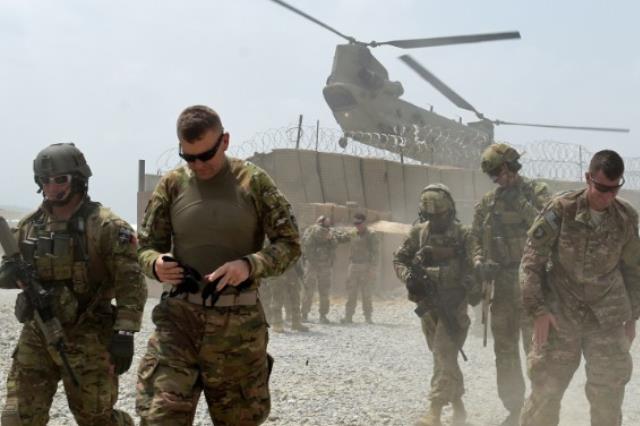-

- Jin Liangxiang
- Senior Research Fellow
- Center for west Asian & African Studies
- Institute for International Strategic Studies

The American withdrawal from Afghanistan in August, ending a 20-year war, will have a variety of long-term geopolitical implications in the region and in the world. It is, first of all, a serious blow to the United States itself. Like many other major U.S. policies over the last two decades, this is just one more that weakened U.S. leadership.
It is true that the U.S. established political, economic and military dominance in the region since the 1991 Gulf War. Some Middle East countries in some way even accepted the leadership of the U.S. as they recognized U.S. military prowess and admired the U.S. style of democracy — though such things had never been recognized by countries like Iran and others Washington labeled radicals.
But history saw that the U.S. had not been able to maintain its leadership for long, and the failure in Afghanistan must be attributed to its own failed policy after 9/11. It was a policy that destroyed its own prestige, credibility and image in the broad Middle East as a protector of human rights and responsible leader.
The war on Afghanistan in the aftermath of 9/11 was initially regarded as legal, and was tacitly authorized by UN Security Council Resolution 1368, which passed in September 2001. Later, however, it was widely criticized as the war went far beyond the stated purpose of fighting terrorism.
As a result of the disregard for innocent lives, unarmed civilians often fell victim to U.S. military operations. Even a family wedding could be destroyed by American bombs. The most recent incident involved Australian soldiers brutally killing civilians, as captured in photographs and videos. The U.S. also fully demonstrated fully its disrespect for the culture of other religions, as American soldiers were found collecting and burning copies of the Quran, which seriously injured the feelings of Muslims, not only in Afghanistan but also in other parts of the world.
The war, expanded by the U.S. to Iraq in 2003, was based initially on the excuse that Saddam Hussein’s regime was connected with Al Qaeda. Another excuse came later — that Saddam Hussein had developed chemical weapons. And that, in turn, led to a U.S. justification for regime change. This raised concerns in the Islamic countries of the Middle East, worried that they themselves could become targets of the U.S. policy of regime change and promotion of democracy.
All in all, excessive use of military force, disrespect for Islam and efforts to change political systems had undermined U.S. leadership in the region.
American elites were not blind to this reality, and reflections in this regard are numerous. Barack Obama, sworn in as U.S. president in 2009, promised in Cairo, Egypt, that he would “seek a new beginning between the United States and Muslims around the world, one based on mutual interest and mutual respect.” He also promised in Ankara, Turkey, several days earlier that “America is not, and never will be, at war with Islam.”
Obama’s Cairo speech was the start of a U.S. effort to improve its image in the Middle East, and illusions that the U.S. would play a reasonable and responsible role in the region returned amid cheers.
But in early 2011, anti-government demonstrations erupted in countries across the Arab world. Protestors in Cairo demanded the ouster of Hosni Mubarak, the president of Egypt at the time. Although he had been a staunch ally of the U.S. for more than 30 years and in urgent need of America’s political support, Obama, a mere year and a half after his friendly speecch, pressed Mubarak to “make right decision” and step down. Obama’s words proved to be the the final straw, and Mubarak was overthrown a few days later.
Had he stood on the right side of history, Obama might have won the confidence of the general public in Middle Eastern countries who were dissatisfied with their own governments. Instead, Obama undermined the credibility of the U.S. in the region. Other allies, mostly political elites, had reason to worry that they themselves could also be abandoned by the U.S. at any moment even though they had served U.S. interests for years.
What’s more, while Obama truly had refrained from using military means in the region, he did meddle in the domestic affairs of countries such as Syria and Libya in the name of standing on the right side of history. This was behind the turbulence in these countries. Despite the initial revolutionary-style excitement, the public in thos countries finally realized that the American pill was not a cure but a poison.
The U.S. withdrawal from Afghanistan this year will save the U.S. from sinking more military resources into the country, Biden said in August, and could pave the way for the Afghan people to determine their own fate. But the withdrawal will prove to be another event detrimental to the American image.
Critics around the globe rightly say hat the U.S. should not have withdrawn its troops before the Afghan government was prepared to fill the void. It should not have withdrawn without detailed discussions with its NATO allies, nor should it have departed in such a hasty and haphazard manner. Just look at the pictures of the Kabul airport in the final days of the evacuation.
The U.S. withdrawal from Afghanistan provides more evidence that it is willing to abandon its proteges at any moment for its own convenience. The government of Ashraf Ghani could reasonably be blamed for low efficiency, corruption and other faults. But it was the U.S. itself that had created and sponsored the government, which had been led earlier by Hamid Karzai. It was America’s baby.
A headline of Al-Arab, a newspaper close to the United Arab Emirates, asked on Sept. 3: “Who can trust the United States anymore?” It added: “With the last American planes leaving the capital, Kabul, policymakers’ thoughts must turn to the future and how to deal with and rely on a new reality in the relationship with the United States.”
Tariq al-Hamid, former editor-in-chief of the Saudi-owned Asharq Al-Awsat newspaper, gave voice to similar concerns on Sept. 5: “If the unilateral U.S. position to withdraw from Afghanistan has worried America’s most important ally, Europe, and NATO, then it is a fortiori that the latest U.S. behavior should be a cause for concern for all moderate Arab countries, as well as the Gulf Cooperation Council countries.”
One of the purposes of the dual visits of Antony Blinken and James Austin, the U.S. secretaries of state and defense, to the Middle East in early September was to assure major U.S. allies that America will stay with them. But will they be reassured? That is the question.
To sum up, many years from now, American scholars might ask how the U.S. leadership was weakened in the Middle East, and they might blame other major competing international actors. But the real answer is simple: The U.S. itself weakened its own leadership in the broad Middle East, step by step, and nobody else but the U.S. is responsible for that. The U.S. has committed many betrayals, among them the global cause of fighting terrorism, as it changed its mission to promoting democracy. It has also betrayed its allies in multiple ways in a betrayal of trust that may be hard to rebuild.
Source of documents:China US Focus, Sep 19
